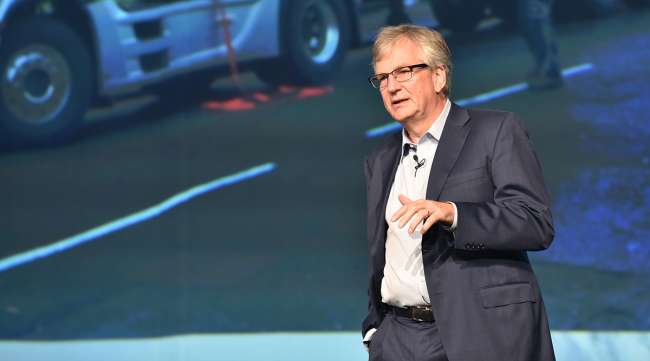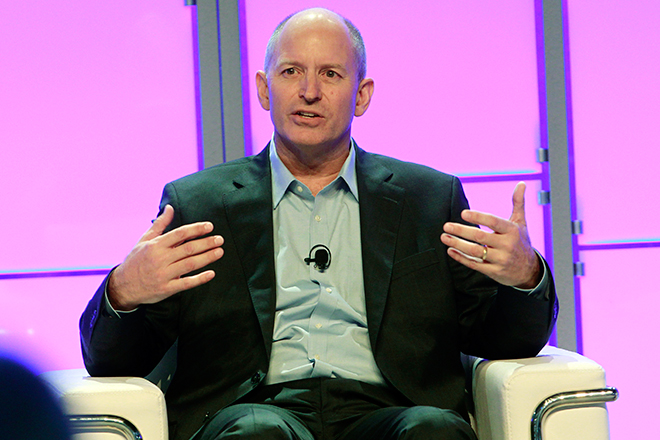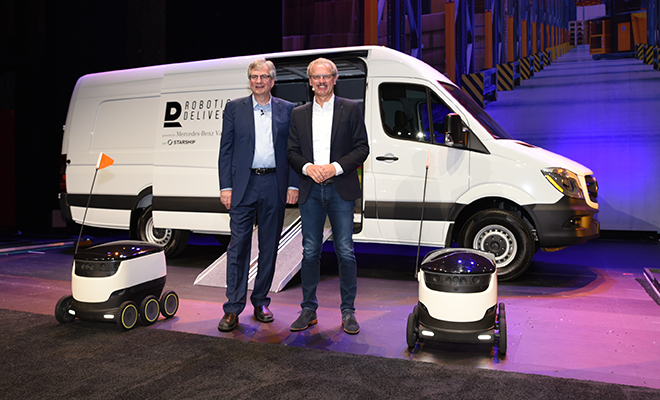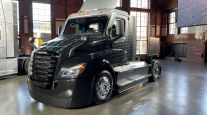Managing Editor, Features and Multimedia
Daimler Trucks Outlines Vision for Electric Vehicles, Platooning, Connectivity

ATLANTA — Daimler Trucks North America outlined its vision for electric trucks and platooning and showcased its latest advances in active safety and connectivity in the first press conference held by a truck manufacturer here at the inaugural North American Commercial Vehicle Show.
DTNA has been testing a truck platooning system on Oregon and Nevada highways and plans to begin fleet testing in early 2018.
The truck maker aims to launch that system commercially by the end of this decade, CEO Roger Nielsen said.
“We see growing customer interest in platooning,” he said Sept. 25. “When America is ready for platooning, DTNA will have a proven, viable solution ready for our customers.”
NACV COVERAGE: All stories | Live blog | Photo gallery
Meanwhile, Daimler subsidiary Mitsubishi Fuso highlighted the recent launch of its fully electric eCanter Class 4 cabover, which the company will roll out to select customers, including UPS Inc., by year’s end.
At an off-site event the previous night at Atlanta’s Fox Theatre, the CEO of Daimler’s global truck and bus business, Martin Daum, said the company also is working to develop electric trucks for greater distances and larger loads, but acknowledged that there are “still a lot of hurdles we have to overcome until that technology is feasible.”
For heavy-duty electric trucks, key considerations include vehicle range, charging time, payload, battery durability and the residual value of the trucks for second and third owners, he said.
“I can’t wait to add a big ‘E’ on the front of the Cascadia and Western Star,” Daum said, with a screen highlighting a mock “CascadiaE” logo as his backdrop.
.@Daimler_CV CEO Martin Daum: I can't wait to add a big "E" on end of a Cascadia or Western Star truck. #NACV2017 pic.twitter.com/W28cud3cmv — Seth Clevenger (@SethClevenger) September 25, 2017
On the NACV show floor, DTNA showed its full family of brands, from Freightliner and Western Star heavy-duty trucks to Thomas Built school buses and Mercedes-Benz and Freightliner vans.
Nielsen revealed more details on DTNA’s platooning plans in an interview with Transport Topics.
The truck maker’s proprietary platooning system will pair two trucks from the same fleet to boost fuel economy through improved aerodynamics. It will reduce the rear truck’s following distance to 40 to 50 feet at highway speeds by synchronizing adaptive cruise control and braking through vehicle-to-vehicle communications.
DTNA’s platooning system also will include active steering capabilities.

Nielsen by John Sommers II for Transport Topics
“What we’ve learned in our testing is we need a third thing: The second truck has to keep itself between the lane markers without the driver’s interaction,” Nielsen told TT. “The second truck has to have active lane keeping.”
Daum also addressed the industry’s path toward automated driving.
“It’s a long way until we see the driverless truck,” he said, but some of that technology is already here in the form of driver-assistance systems.
DTNA is preparing to introduce the latest version of its proprietary active safety technology, Detroit Assurance 4.0, which adds warnings and partial braking when it detects pedestrians as well as braking to a full stop on stationary objects and blind-spot monitoring.
By the end of the decade, a future version of that active-safety platform will introduce lane-keeping assistance with active steering, Nielsen said.
Meanwhile, DTNA continues to expand its connected-vehicle capabilities.
“We have trucks all over the world connected to the internet, transmitting data to help you run the truck better and service the truck better,” Daum said.
Fleets with the new Freightliner Cascadia will soon be able to utilize over-the-air updates through Detroit Connect, including the ability to remotely program engine parameters and accept Detroit firmware updates.
At the event at the Fox Theatre, attendees also got a glimpse at what the future of final-mile logistics might look like.
Volker Mornhinweg, head of Mercedes-Benz Vans, introduced a van on stage that opened its side door to deploy package-delivery robots designed for sidewalks.

Daum, Mornhinweg and robotic delivery vehicle via Daimler Trucks North America
The company is embracing new technologies to help customers meet the demands of the e-commerce market, which is expected to grow by more than 70% between 2016 and 2020, he said. “This is a great opportunity for our customers but also a great challenge.”
On the NACV show floor, Mercedes-Benz also displayed its Vision Van concept, which features an automated cargo bay and a pair of roof-mounted drones.




